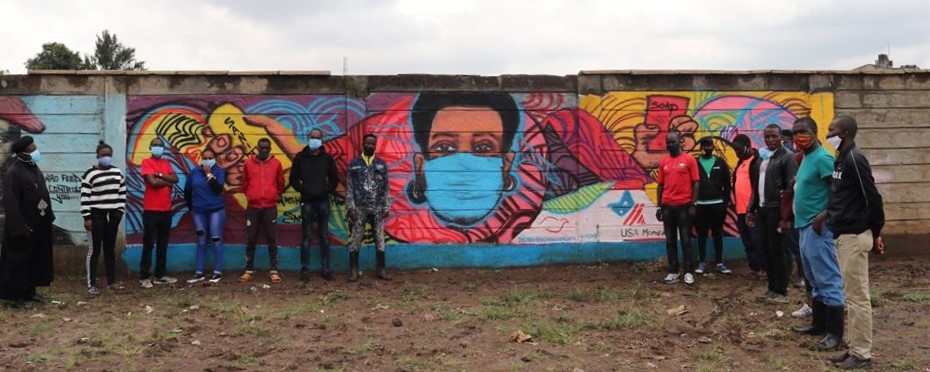The Kariobangi “Wall of Peace” on COVID-19 Unveiled
June 15, 2020Religions for Peace’s Kenya Interfaith Youth Network (KIYN) have joined creative forces with the young people of Kariobangi, [1] Kenya to design and paint a mural prominently displaying a masked young person and featuring hands gripping sanitizer and soap, all complemented by Religions for Peace’s signature peace dove. The artists unveiled their creation during an event where masks and sanitizers were distributed affected families in Kariobangi. Kariobangi is a low-income, densely populated informal settlement about 15 kilometers north of Nairobi.
The KIYN, led by the Chairman of Religions for Peace’s Interreligious Council of Kenya (IRCK), Rev. Fr. Joseph Mutie, and five KIYN youth from both Christian and Muslim communities initiated the idea of a “Wall of Peace” to target the Kariobangi community, which is challenging to target with traditional, government-led approaches of outreach and trainings. Furthermore, without clean water and access to essential supplies, these traditional approaches would be ineffective.
The diverse religious communities represented in the interfaith youth network are familiar with Kariobangi and know that young people in the community pass time playing informal sports like football and karate, and by painting murals. The KIYN tapped into the creativity and goodwill of the youth living in Kariobangi and tailored their approach their needs while providing a creative outlet to centralize the needs of their community during this pandemic.
The “Wall of Peace” will be frequented often, as it lines the football field and Kariobangi Social Hall, a central meeting gathering area for people of all ages. The wall serves as a physical pillar and reminder that youth have a role to playing in overcoming COVID-19. It remains a physical epitaph from which they draw lessons of prevention and protection each day that they access the social hall, play sports, and go about their day-to-day activities.
The Kariobangi Police Station also benefit from the mural. The officers on duty during the unveiling event received masks and alcohol-based hand sanitizers to aid them in advancing prevention in the discharge of their duties.
One major point of encouragement from the activity was on the measures undertaken by the Kariobangi youth in taking care of each other through peer accountability and income-generating activities. The mural catalyzed the creation of an advocacy and civic education platform through which they can collaborate with the relevant authorities towards educating their fellow youth and community on their rights and protection of religious minorities.
